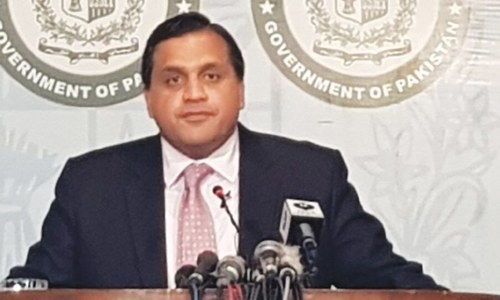Politics trumped sports and reason once again.
The year saw Pakistan defeating India to lift the ICC Championship Trophy. India responded by not lifting its ban on bilateral fixtures between the two.
Repression of religion and using religion to repress continued to characterise fraying civil liberties in both countries.
The Kulbhushan Jadhav saga dominated the media discourse. The spy case shifting to The Hague, and Pakistan’s deft move to let Jadhav’s wife and mother meet him underscored media narrative.
Jadhav is no Gary Powers and Pakistan is no Soviet Union, of course, even if Steven Spielberg’s less discussed marvel of 2017 – Bridge of Spies – seemed to allegorise the dominant theme of India-Pakistan relations during the last 12 months. That was before the Gujarat elections shifted the focus to a quaint ‘Pakistani plot’ to defeat Prime Minister Narendra Modi’s Bharatiya Janata Party (BJP) in the state’s assembly election.
Spielberg’s story dealt with CIA pilot Powers who flew high-altitude U-2 spy planes from a secret airfield in Peshawar to spy on Soviet military installations.
The year saw India offering to outdo Peshawar as a staging post for the US, ostensibly keeping China in the crosshairs, even committing its navy to wade into the choppy South China Sea. A reason, or a ruse, cited is that China, for reasons best known to itself, refuses to accept Indian demands to punish Hafiz Saeed as a globally declared terrorist.
Spielberg’s spy swap between Moscow and Washington took place on a bridge that connected East and West Berlin. If reports are a pointer then the missing and retired Pakistan army officer Lt-Col Habib Zahir could be produced by the Indians as the bargaining chip for an exchange of spies, real or alleged as they may be. There is no dearth of bridges rusting with disuse to make the swap if and when one happens.
Keeping its tryst with unreason, 2017 should go down in bilateral record books as the year the visa drought struck, when India choked visits by Pakistanis, including foreign passport holders with a Pakistani parentage, or a Pakistani past, thus putting paid to hopes of the much advertised people-to-people contact. This appears to reflect a perverse sentiment that comes with the right-wing party in power, rather unrelated to any national self-interest.
Delhi’s Chief Minister Arvind Kejriwal appeared to disagree the other day that a cricket victory in London was all that had lifted Pakistan’s morale vis-a-vis India in 2017. According to Kejriwal, Mr Modi scored massive own goals without visiting a stadium and that should please the neighbour.
“What Pakistan could not do to India in 70 years, Modi has done in three years,” Kejriwal told a public meeting to commemorate five years of his Aam Aadmi Party.
The words echoed through the last days of a violent and fractious 2017.
“Modi has weakened the country, as only he could, by polarising the society so sharply it would make any hostile neighbour smile with delight.”
Kejriwal seemed to miss the other side of the picture, however. Pakistan has worked like Aladdin’s lamp for Mr Modi. He first showed its magical prowess by accusing Pakistan of staging the Godhra train fire in February 2002, a charge he dropped but not before it catapulted him to a spiral of unabated political conquests.
Mr Modi rubbed the lamp again to finesse the Gujarat elections in December as he did with considerable success in other electoral races earlier.
It is interesting to remember today that Mr Modi set off the downward spiral in India-Pakistan ties by objecting to a tea the Pakistan high commissioner had with Hurriyat leaders in Delhi in August 2014. He ended 2017 by widening his list of allergens, worse, suspects, beyond Hurriyat, accusing a former prime minister, a former vice-president and a former army chief, among other Indians, some of whom had served as envoys in Islamabad, of conspiring with Pakistan’s high commissioner and a former foreign minister from Lahore to defeat him in Gujarat.
In their unending cat-and-mouse, both countries joined the Shanghai Cooperation Organisation (SCO) as full members in 2017, and both quickly moved to service their opposite commitments, including to US-led alternatives.
The joker in the pack was Russia, which has surprised observers by stalling Indian criticism of Pakistan at international forums.
It all came to a crunch with a senior Russian envoy challenging a joint assault by Indian and Afghan leaders at an international conclave in Amritsar. Russia’s convergence with Pakistan’s interests in Afghanistan and China’s steady progress with CPEC continued to mock Indian diplomacy in the region and beyond during the year.
The New Year, like the old, promises to be a fraught chessboard for India and Pakistan where international and domestic players could determine their bilateral destiny. And their moves are primed to be directed from anywhere – in the South China Sea or the Middle East, from the strategic Indian Ocean to lucrative Central Asia, from Moscow to Washington and Beijing, from Riyadh to Tehran, from Donald Trump to Vladimir Putin and Xi Jinping, and from Ayodhya to Kabul.
That is as imponderable as it gets in the tense contest between South Asia’s nuclear-armed neighbours. The year 2017 was not any different.















































